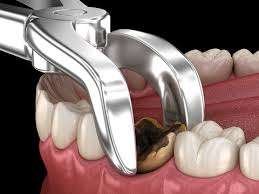Relaxing Tooth Extraction: Say Goodbye to Problem Teeth
PAINLESS TOOTH EXTRACTIONS IN RAVET
at affordable rates
Understanding What is Tooth Extraction

- Extraction is the process of the removal of teeth under local anesthesia which numbs the tooth site. With the help of elevator, dentist elevate tooth from the socket and with the help of forceps, they remove your tooth from the socket.
- Tooth extraction is performed by a dentist or oral surgeon and is a relatively quick outpatient procedure with either local, general, intravenous anesthesia, or a combination. Removing visible teeth is a simple extraction. Teeth that are broken, below the surface, or impacted require a more involved procedure.
- While many teens and some adults get their wisdom teeth removed, there are other reasons why tooth extraction may be necessary in adulthood.
- Some reasons are excessive tooth decay, tooth infection, and crowding can all require a tooth extraction. Those who get braces may need one or two teeth removed to provide room for their other teeth as they shift into place. Additionally, those who are undergoing chemotherapy or are about to have an organ transplant may need compromised teeth removed in order to keep their mouth healthy.
Need of Teeth Extraction
- Dental trauma: When a tooth is severely damaged due to injury.
- Irreparable damage: When a tooth cannot be fixed with fillings or root canals.
- Periodontal disease: A condition affecting the gums and bones supporting the teeth.
- Impacted teeth: Teeth, like wisdom teeth, stuck in the jawbone and unable to emerge properly.
- Orthodontic treatment: Sometimes teeth need to be extracted to make room for proper alignment during braces or other orthodontic procedures
Procedure of tooth extraction
- Tooth extraction begins with your dentist numbing the area around the tooth using local anesthesia.
- Then, they gently lift the tooth from its socket using a tool called an elevator and carefully remove it with forceps.
Why do we have wisdom teeth?
- Between ages 17 and 25, most adults develop their third set of molars, commonly known as wisdom teeth.
- These teeth, the last to appear, usually emerge at the back of the mouth during this time frame, though sometimes they may appear later.
Wisdom tooth extraction or disimpaction
- Disimpaction involves minor surgery to remove teeth trapped within the alveolar bone, particularly wisdom teeth, which are the most common.
- Wisdom teeth, typically the last to erupt between ages 17 to 21, may become tilted or fail to emerge due to limited space.
- Impacted teeth often show no symptoms and are detected through X-rays.
Symptoms of impacted teeth
- Food lodges easily.
- Difficulty opening mouth.
- Pain while chewing.
- Swelling on the face.
- Red, swollen gums.
Complications from impacted teeth
- Cavities
- Food lodgment
- Infections
- Cysts
- Damage to other teeth
- Gum disease due to cleaning difficulties
Post-operative instructions after tooth removal
- Do not rinse the mouth for 24 hours to prevent dislodgement of blood clots, which may cause painful dry socket.
- Avoid chewing hard foods at the extraction site until healing is complete.
- Refrain from smoking.
- Rinse with warm salt water after 24 hours.
- Use mouthwash after meals to keep the wound clean.
- Take medications prescribed by the doctor.
Schedule Your Dental Appointment
- +91 9022658566
- vaibhavkn43@gmail.com
- Office No.102, Pristine Shatrunjay C Wing, Ravet Pradhikaran, Bhondve Cir, Chowk, Ravet, Pimpri-Chinchwad, Maharashtra 412101
Opening Hours
Monday through Sunday, all days.
Morning – 10 AM to 2 PM. Evening – 5 PM to 9 PM.
Sunday, by appointments only.
